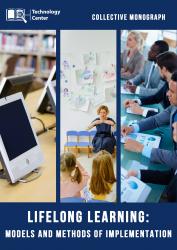Lifelong educational process synergy of Scandinavian and Ukrainian experience
Keywords:
maturity, organizational competence, pedagogical experiment, methods, criterion, criterionlevels, correlation, statistics, lists in physical culture and sports, adult education, concept of continuous adult education, new paradigm of, adult education development trends, megatrends in adult education, soft, niversal (ability)/theoretical (knowledge) models of education, development mechanism, regional (meso)/global (planetary) levels, interstate cooperation in fields of adult education, Scandinavian model of adult education, innovative efficiency models, foreign language communication, , lifelong learning, multiculturalism, lifelong learning, flipped classroom approach, task-based learning, immersion models, technology application, language learning resources, student-centered learning, language immersion, intercultural competencies, academic staff, development, institutional autonomy, personnel policy, university, receptivity to the new, cognitive function, regulatory function, classification features, form of knowledge of reality, leading aspects of the perceived object, dominant feelings, field of activity, components of the subject's experience, cognitive-emotional processes, environment of selected information, hierarchical level of the management entity, means of developing receptivity to the new, idea management systemAbstract
In the context of lifelong education management, this work focuses on the current problems of adult education in Ukraine and Sweden, which acquire special significance through the prism of the "value rearmament" of a person of the 21st century, the formation of a new value consciousness of a specialist with higher education as a global ethic of a new historical era, the main components of which believe: the desire to preserve the spiritual essence of education in the conditions of its mass; formation, strengthening and multiplication of authentic personal values; upholding the idea of the priority of the development of "human in man"; multiculturalism; rehabilitation within the market of educational services of the idea of a standard. The scientific relevance of the research topic is expressed in the unsolved range of problems related to the search for the most effective forms of organization of the adult education system and the identification of pedagogical conditions for using the Swedish experience of adult education in domestic pedagogical theory and practice. The need for "lifelong learning" is justified by the rapid changes in economic conditions, technological systems and the urgent need to orient a competitive specialist to the growing amount of new data and knowledge in order to focus on finding ways to overcome skill shortages and meet educational needs under the conditions of career growth and personal improvement and development. It is emphasized that the world practice, in particular the Swedish experience, of such training is based on the modern paradigm of continuous education - "lifelong learning".
The analysis of two models of education (theoretical (knowledge) and universal (ability)) is carried out, respectively, from the standpoint of the reproduction of cultural and historical experience and the development mechanism regarding the potential opportunities for radical changes in the practice of adult education, taking into account the specifics of a traditional and dynamic society. The features of trends in adult education are clarified and it is noted that they are manifested both at the global (megatrend) and at the local levels.
Attention is focused on the author's interactive intensive course, taking into account the long-standing traditions of the rich Swedish experience regarding a carefully thought-out system of formal and informal open education for adults, the purpose of which is to improve the professional, reflective competencies of those seeking education; deepening knowledge about the process of continuous education of adults in domestic and Swedish pedagogical theory and practice; identification of positive foreign experience and pedagogical conditions for the introduction of the "Swedish model" in the practical work of higher education institutions and other educational institutions in Ukraine, as well as in the system of domestic informal open education of adults; practice in the design of the socio-pedagogical model of the Ukrainian higher national school.

LIFELONG LEARNING: MODELS AND METHODS OF IMPLEMENTATION
Downloads
Pages
Published
Categories
License

This work is licensed under a Creative Commons Attribution-NonCommercial-NoDerivatives 4.0 International License.

